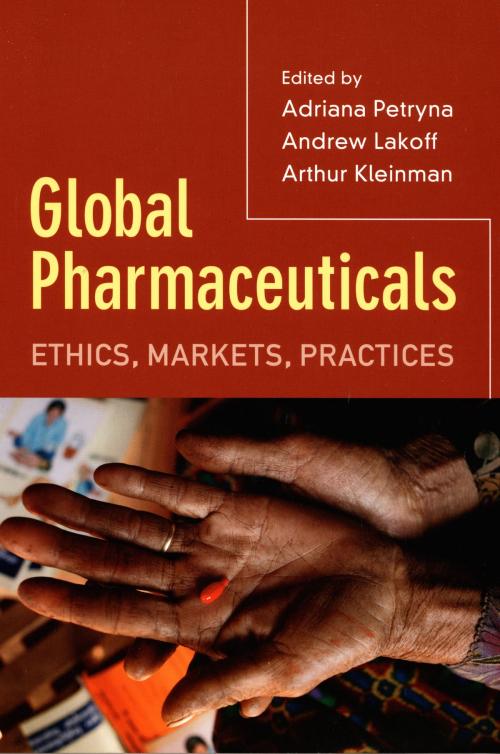Global Pharmaceuticals
Ethics, Markets, Practices
Business & Finance, Economics, International, Industries & Professions, Industries| Author: | ISBN: | 9780822387916 | |
| Publisher: | Duke University Press | Publication: | March 15, 2006 |
| Imprint: | Duke University Press Books | Language: | English |
| Author: | |
| ISBN: | 9780822387916 |
| Publisher: | Duke University Press |
| Publication: | March 15, 2006 |
| Imprint: | Duke University Press Books |
| Language: | English |
In some parts of the world spending on pharmaceuticals is astronomical. In others people do not have access to basic or life-saving drugs. Individuals struggle to afford medications; whole populations are neglected, considered too poor to constitute profitable markets for the development and distribution of necessary drugs. The ethnographies brought together in this timely collection analyze both the dynamics of the burgeoning international pharmaceutical trade and the global inequalities that emerge from and are reinforced by market-driven medicine. They demonstrate that questions about who will be treated and who will not filter through every phase of pharmaceutical production, from preclinical research to human testing, marketing, distribution, prescription, and consumption.
Whether considering how American drug companies seek to create a market for antidepressants in Japan, how Brazil has created a model HIV/AIDS prevention and treatment program, or how the urban poor in Delhi understand and access healthcare, these essays illuminate the roles of corporations, governments, NGOs, and individuals in relation to global pharmaceuticals. Some essays show how individual and communal identities are affected by the marketing and availability of medications. Among these are an exploration of how the pharmaceutical industry shapes popular and expert understandings of mental illness in North America and Great Britain. There is also an examination of the agonizing choices facing Ugandan families trying to finance AIDS treatment. Several essays explore the inner workings of the emerging international pharmaceutical regime. One looks at the expanding quest for clinical research subjects; another at the entwining of science and business interests in the Argentine market for psychotropic medications. By bringing the moral calculations involved in the production and distribution of pharmaceuticals into stark relief, this collection charts urgent new territory for social scientific research.
Contributors. Kalman Applbaum, João Biehl, Ranendra K. Das, Veena Das, David Healy, Arthur Kleinman, Betty Kyaddondo, Andrew Lakoff, Anne Lovell, Lotte Meinert, Adriana Petryna, Michael A. Whyte, Susan Reynolds Whyte
In some parts of the world spending on pharmaceuticals is astronomical. In others people do not have access to basic or life-saving drugs. Individuals struggle to afford medications; whole populations are neglected, considered too poor to constitute profitable markets for the development and distribution of necessary drugs. The ethnographies brought together in this timely collection analyze both the dynamics of the burgeoning international pharmaceutical trade and the global inequalities that emerge from and are reinforced by market-driven medicine. They demonstrate that questions about who will be treated and who will not filter through every phase of pharmaceutical production, from preclinical research to human testing, marketing, distribution, prescription, and consumption.
Whether considering how American drug companies seek to create a market for antidepressants in Japan, how Brazil has created a model HIV/AIDS prevention and treatment program, or how the urban poor in Delhi understand and access healthcare, these essays illuminate the roles of corporations, governments, NGOs, and individuals in relation to global pharmaceuticals. Some essays show how individual and communal identities are affected by the marketing and availability of medications. Among these are an exploration of how the pharmaceutical industry shapes popular and expert understandings of mental illness in North America and Great Britain. There is also an examination of the agonizing choices facing Ugandan families trying to finance AIDS treatment. Several essays explore the inner workings of the emerging international pharmaceutical regime. One looks at the expanding quest for clinical research subjects; another at the entwining of science and business interests in the Argentine market for psychotropic medications. By bringing the moral calculations involved in the production and distribution of pharmaceuticals into stark relief, this collection charts urgent new territory for social scientific research.
Contributors. Kalman Applbaum, João Biehl, Ranendra K. Das, Veena Das, David Healy, Arthur Kleinman, Betty Kyaddondo, Andrew Lakoff, Anne Lovell, Lotte Meinert, Adriana Petryna, Michael A. Whyte, Susan Reynolds Whyte















